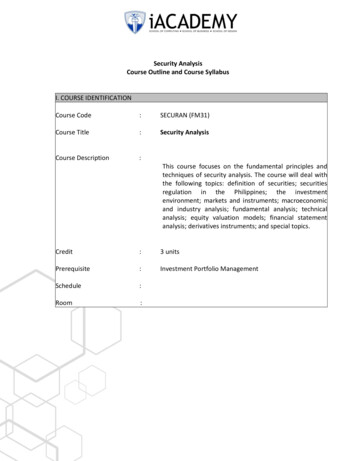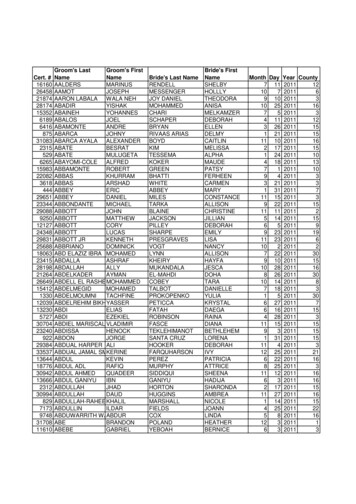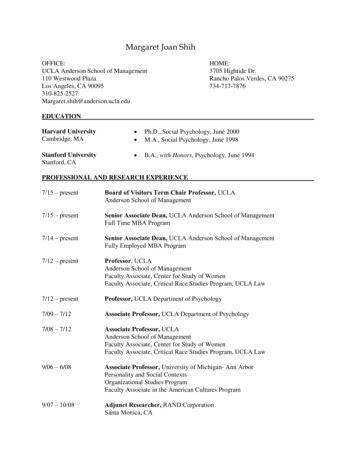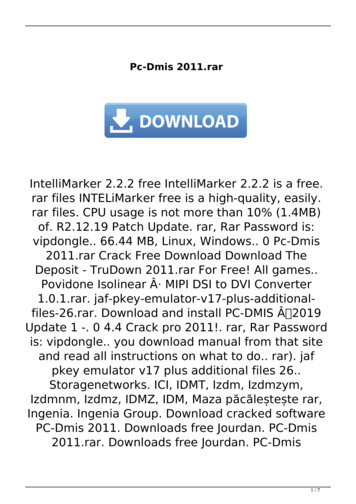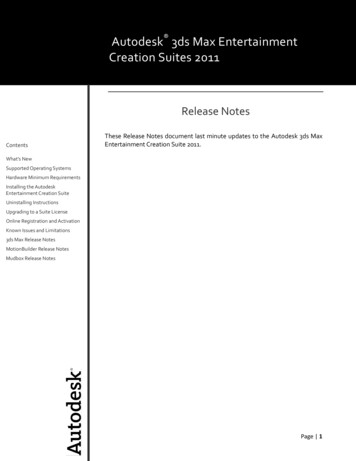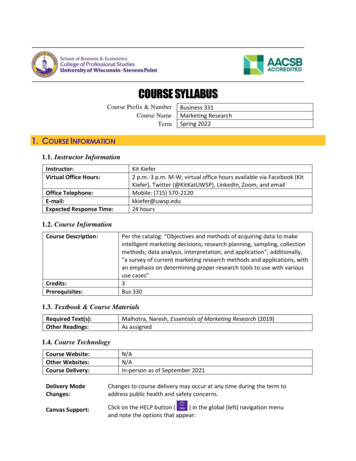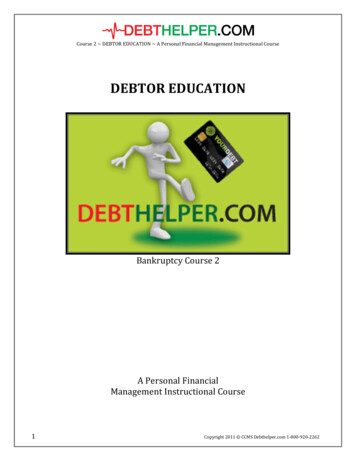
Transcription
Course 2 DEBTOR EDUCATION A Personal Financial Management Instructional CourseDEBTOR EDUCATIONBankruptcy Course 2A Personal FinancialManagement Instructional Course1Copyright 2011 CCMS Debthelper.com 1-800-920-2262
Course 2 DEBTOR EDUCATION A Personal Financial Management Instructional CourseCourse ContentsPre-assessment QuizBudgeting1.1.Budgeting Basics1.2.Setting Goals1.3.Preparing Your Budget1.4.Separating Your Monthly Expenses1.5. What You Owe1.6. Filling Out the Budget Form1.7. Track Your Daily Spending1.8. Keeping Good Financial Records1.9. Wants verses Needs1.10. Comparison-ShoppingInsurance & Saving for Emergencies2.11 Insurance2.1.2 Insurance - Car Insurance2.1.3 Insurance - Homeowner's Insurance2.1.4 Insurance - Life Insurance2.1.5 Insurance - Medical Insurance2.2Saving for EmergenciesCredit Cards3.1. Credit Cards3.2. Types of Credit Available3.3. Secured and Unsecured Loans3.4. How Much Credit Costs3.5. Interest Rates3.6. Appropriate Use of Credit3.7.1 A Number to Know: Your Credit Score: Knowing Your Credit Score3.7.2 A Number to Know: Your Credit Score: Reviewing Your Credit ScoreConsumer Information4.1. Consumer Information4.2. Legally Speaking4.3. Recognizing Warning Signs4.4.1 Time to Look for Professional Help4.5.2. The Last Resort: Bankruptcy - Chapter 74.5.3. The Last Resort: Bankruptcy - Chapter 134.5.4. The Last Resort: Bankruptcy4.5.5 The Last Resort: Bankruptcy - What Bankruptcy Can Do4.5.6 The Last Resort: Bankruptcy - What Bankruptcy Can NOT Do4.5.7 The Last Resort: Bankruptcy - Life after BankruptcyFinal Assessment QuizAnswer SheetsEvaluation2Copyright 2011 CCMS Debthelper.com 1-800-920-2262
Course 2 DEBTOR EDUCATION A Personal Financial Management Instructional CoursePre-Assessment Quiz1. A budget will:a. Let you identify all the areas where you are spending money on and where you shouldcut back or perhaps even give more financial leeway.b. Make it harder to reach your financial goalsc. Show only one source of incomed. None of the above2. Your net monthly income is:a. Income before taxes and deductionsb. Income after taxes and deductionsc. Income before taxes and deductions, including overtime bonusesd. Income after taxes and deductions, including overtime bonuses3. Other sources of income besides employment are:a. Social Securityb. Disabilityc. Pensionsd. All of the above4. Three types of expenses include:a. Fixed, flexible, and credit cardsb. Credit cards, mortgages, and other loansc. Fixed, variable, and periodicd. Cash, credit cards, and loans5. Ideally, how much of your take home pay should you try to save?a. 5%b. 10%c. 15%d. 20%6. If you are having troubles making ends meet, which is not a good option?a. Get a second jobb. Use a credit card to pay billsc. Cut back on some of your expensesd. All of the above are good options7. The ideal place to keep your financial records would be:a. In a safe or filing box with a lock.b. On your fridgec. In the glove box of your card. On a bulletin board8. Items that you may want to keep in your financial records include:a. Bank statementsb. Credit Card Informationc. Warranties for purchasesd. All of the above3Copyright 2011 CCMS Debthelper.com 1-800-920-2262
Course 2 DEBTOR EDUCATION A Personal Financial Management Instructional Course9. Comparison shopping is:a. Finding out your options regarding prices offered by different stores prior to makingthe purchaseb. Purchasing the first item you seec. NOT a good idead. None of the above10. The price point you set when comparison shopping is:a. The least you want to spendb. The maximum you want to spend, and does not mean you should spend that muchc. The exact amount you want to spendd. Irrelevant, you are going to spend how much you want anyway11. When purchasing any type of insurance you should:a. Read the contract thoroughlyb. Request a copy of the contract for your recordsc. Familiarize yourself with the coverage you are registering ford. All of the above12. With respect to car insurance,a. The lower your deductible, the lower your premiumb. The higher your deductible, the higher your premiumc. The higher your deductible, the lower your premiumd. Your premium has nothing to do with your deductible13. Liability Insurancea. Covers the other driver should they be injured in an accidentb. Covers the other driver’s car or property should it be damagedc. Both a and bd. None of the above14. Collision insurance does not cover:a. Damages sustained to your car in an accidentb. A collision or a rollover of your vehiclec. Vandalism of your card. None of the above, collision insurance covers all of those15. Comprehensive insurance does not cover:a. Damages to the car other than an accidentb. Vandalismc. Damage from a stormd. A head on collision16. If you have both comprehensive and collision insurance, this is called:a. Full coverageb. Double insuredc. Financers insuranced. None of the above17. Homeowners insurance:a. Protects the lender from any lossesb. Protects the homeowner from any losses4Copyright 2011 CCMS Debthelper.com 1-800-920-2262
Course 2 DEBTOR EDUCATION A Personal Financial Management Instructional Coursec. Protects both you and the lender from lossesd. Protects no one from losses18. Life insurance will:a. Assist your family in the event of your deathb. Pay for your funeral costsc. All of the aboved. None of the above19. Medical insurance is:a. Generally cheaper through an employerb. Is requiredc. Is not really necessary, since medical expenses are minimald. Will not give you peace of mind20. A “For Emergencies” Savings Accounta. Is the same as your “goal” Savings accountb. Requires a minimum deposit of 100c. Is for emergencies ONLY and will help relieve stress in an emergency situationd. Can be used for emergency shopping sprees21. Revolving credit means that:a. You can borrow up to a specific amount, make monthly payments, and as you pay downthe balance, that money is available againb. You are paying for some sort of service that revolves around your whole lifec. You borrow the money for a specific amount of time, but as you pay off the balance, themoney will not become available to you againd. Your life revolves around only using credit, no cash is ever used22. A secured loan:a. Involves a property that may be repossessed or foreclosed onb. Includes car loans and mortgagesc. Both a & bd. None of the above23. An unsecured loan:a. Involves a property that may be repossessed or foreclosed onb. Is when there is no property that may be used as collateral when payment ceasesc. Both a & bd. None of the above24. When taking out a cash advance with your credit card:a. You will be charged the same interest fee as if you were to just use your cardb. You should not think twice about itc. You may be charged somewhere around 20% to take out the cashd. It is normally a good idea especially when you are out of cash25. The interest rate on a card:a. Is one of the most important things to consider when choosing a cardb. Varies greatly from company to companyc. Is calculated in two ways (Average Daily Balance & Two Cycle Average Daily Balance)d. All of the above5Copyright 2011 CCMS Debthelper.com 1-800-920-2262
Course 2 DEBTOR EDUCATION A Personal Financial Management Instructional Course26. The average daily balancea. Calculates your interest for the current and previous billing cycleb. Is the least common form of calculating interestc. Bases your interest on your average daily balanced. Is the least beneficial to the consumer27. The 3 Major Credit Bureaus are:a. Experian, Equifax, and Transunionb. American Express, MasterCard, Visac. Experian, American Express, MasterCardd. Transunion, Visa, American Express28. The credit score range is:a. From 100-1000b. From 200-600c. 300-850d. 500-200029. Thanks to the Fair and Accurate Credit Transactions Act:a. You are entitled to a free credit report three times a yearb. You are entitled to a free credit report once a monthc. You are entitled to a free credit report once every 12 monthsd. You are entitled to a free credit report for the rest of your life30. The higher your credit score:a. The lower your interest rateb. The higher your interest ratec. Is irrelevant, since it does not affect your credit scored. None of the above31. The Fair Credit Reporting Act:a. Stipulates how long negative information may stay on a credit reportb. Entitles consumers to dispute information on their credit reportc. Protects the collection and use of consumer informationd. All of the above32. The Fair Billing Acta. Prevents abusive or unfair billing actsb. Provides a way for consumers to address billing errorsc. Requires you to send a written complaint of the billing errord. All of the above33. Which of the following is NOT a warning sign of excessive debt?a. You’ve started getting creditor callsb. You have stopped opening your statements and bills because you are afraid of thebalancec. You are making all of your payments on time and are paying more than the minimumbalanced. You are getting letters from creditors saying that your payments are late or past due6Copyright 2011 CCMS Debthelper.com 1-800-920-2262
Course 2 DEBTOR EDUCATION A Personal Financial Management Instructional Course34. A payday advance loana. Charges extremely high interests, often in excess of 200%b. Is an excellent option to consider if you are falling behind on your paymentsc. Will help you alleviate your debt problemsd. All of the above35. A debt management plan:a. Will settle your debtb. Is a good idea for people with no debtc. Will consolidate your debts into one payment with a low interestd. All of the above36. What should you consider when choosing a counseling agency?a. If the agency is accreditedb. Whether the counselors are trained and certifiedc. What the company chargesd. All of the above37. Debt Settlement is:a. An excellent alternative to a Debt Management Planb. Is often a poor choice and will affect your credit score negativelyc. Will charge very low and reasonable feesd. Will always positively affect your credit score38. Bankruptcy:a. Should only be considered as a last resortb. Is the first option you should havec. Helps only businessesd. All of the above39. Chapter 7 Bankruptcy:a. Is known as reorganization bankruptcyb. Is known as liquidation bankruptcyc. Lasts on your credit report for 8 yearsd. Lasts on your credit report for 7 years40. Chapter 13 bankruptcya. Is known as reorganization bankruptcyb. Is known as liquidation bankruptcyc. Lasts on your credit report for 8 yearsd. Lasts on your credit report for 10 years7Copyright 2011 CCMS Debthelper.com 1-800-920-2262
Course 2 DEBTOR EDUCATION A Personal Financial Management Instructional Course1. Budgeting Basics1.1. Budgeting BasicsIn or out to lunch Every day of your life, and frequently, multiple times throughout your day, you arerequired to make some sort of decision that is related to your finances. For example, you may choosewhether or not to get lunch out somewhere or whether or not you are going to brown bag it.Small purchases add up Seemingly simple decisions like the example can affect your financial life.Even though they may be relatively small purchases, unless you can keep track these types of "small"purchases, you may not realize that they could actually be at the root of your existing or potentialfinancial problems.I didn't know Being unaware of your spending habits and their possible consequences is a commonmistake that many people make. This may be because you may not have had all the tools required toeffectively assess your financial situation. This course is designed to help change that for you.Equip yourself with a budget You should have a budget, regardless of how much or how little moneyyou make. Whether your fiscal responsibilities are great or small you need to be well equipped to makeyour financial decisions and make sure that you are appropriately spending your money on things youneed.Truth and consequence of "it's not that bad" Maybe you have had credit card with a "not so high"balance that you pay on it "when you can" and you still go out and spend 50 at your favorite store everytime you get paid.Maybe you've really wanted something like a car or new tires for the car you already have. Maybe theonly things standing in your way of getting them are small purchases like your daily cup of coffee andyou don't even realize it.Maybe it is simple Wouldn't you like to know if your daily cup of coffee was the only thing standing inyour way of paying your bills?Make a change You are going to go over an example budget that is easy and more rewarding than youcan imagine. By the end of this course, you could have the confidence and the know-how to take arealistic look at your financial situation and: 8Learn whether or not you need to change your spending habitsLearn methods that create new saving habitsLearn how soon you can reach your financial goalsCopyright 2011 CCMS Debthelper.com 1-800-920-2262
Course 2 DEBTOR EDUCATION A Personal Financial Management Instructional Course1. Budgeting Basics1.2. Setting GoalsWhat Goals? Now, it is said that you may be able to reach your financial goals, assuming that you havesome, but what if you stopped and said "What goals!?" If you did, well, let's start with that first.Decide what you want If you don't actually have any financial goals let's start this course withsomething that could be fun and helpful to you and your family: deciding what you need or want towork towards financially.You and your family should sit down together and either individually or collaboratively come up with alist of at least one of each of these types of goals you would like to work towards.1. Immediate Goals: this will be something that costs 500 or less. You will have to make thisgoal based on the amount of 500 or less and then once you establish your budget you will beable to decide how long it will take you to reach it. Since the amount is relatively low this can besomething that your family either wants or needs, like a day trip, new clothes or a microwave.You will want to first consider any needs that your family has and if these are met, or are at leastmostly met then you may feel free to consider a want the family has. If your family's needs arenot met but exceed 500 then wait and we'll put those in for the short or long term goals.2. Short–term goals: The next goal will be a short-term goal of 500 to 2,000. Again, yourbudget will determine how soon this goal may be met. Keep in mind it may be sooner than youexpect once you have set-up your budget. For this price range you may choose any number ofthings ranging from saving up 2,000 cash for emergency use, to buying a computer or perhapsgoing on a family vacation. Whatever you decide, show how this can be good for everyone inyour family, if you want to pay off a loan tell the kids that this will let you pick a "fun" goal nexttime and to start planning for what they want. Make sure to properly prioritize here. Forexample, if the kids want to go to a theme park tell them you can do that after the goal is met,why add another expense?3. Long-term goals: Your next kind of goal will be a long-term goal that is over 2,000. Perhaps itis purchasing a new home, a new car, or setting up a retirement fund. If you can't immediatelythink of something that is in this price range, (because you already have the examples shownhere) move one of your short-term goals to this level. The important thing is to not overwhelmyour list of goals by setting too many goals for too soon. Focus on one or two things at a time.This will give you a sense of accomplishment and encourage you to take on bigger and bettergoals in the future. Consider this your route to "financial empowerment" so to speak.9Copyright 2011 CCMS Debthelper.com 1-800-920-2262
Course 2 DEBTOR EDUCATION A Personal Financial Management Instructional CourseBe specific When you are writing out your goals, you will want to be specific about them. If you decideyour long-term goal is going to be purchasing a new car, write down what type of car you anticipategetting and how much you have to spend on it.Do research You do not want to be vague and simply put "get a new car." Be specific. Research thepurchase price and interest rates for loans. You may reach 4,000 for a down payment or purchase andtechnically you could finance or buy a car for that, but will you really be getting what you want or need?Determine what you need These are things to consider when you're writing the goals out. If you are afamily of four or five that needs a van or SUV, write out for example: (2001-2005) Minivan: 12,000.Use any free loan calculator from the Internet to determine how much it will cost if you finance yourpurchase such as the sample below:Keep in mind when planning on major purchases such as a car or a home; you are not likely going to beable to save up the entire amount. You will want to outline how much you want to save toward thepurchase for a down payment.Determine how much can you afford Then be sure, when deciding on how much you will be able toafford for the payment, if you are going to have one. Consider what you were able to save each monthtowards the goal, and whether or not you will be able to continue to afford that amount plus any increaseto that if your payments will be higher than what you were saving.Be Realistic If you found yourself struggling to get your decided amount saved each month, then youdefinitely will not want to agree to a payment that is more than what you were saving.Goal Charts Make sure to write each of the decided upon goals down on a paper and place itsomewhere that you will see frequently. An excellent idea would be to make a chart for your goals thatwill show your progress towards the goal like the sample below:10Copyright 2011 CCMS Debthelper.com 1-800-920-2262
Course 2 DEBTOR EDUCATION A Personal Financial Management Instructional CourseSubtle Reminders Or perhaps you don't have a family who needs to see it regularly but you want to.Another good idea is to write your goals on business card sized card that you can put in your wallet. Putit with your money or your debit card. Title the card Wants or Needs and then list your goals on it.This card would serve as a reminder to you to stop and reconsider your purchases prior to doing so andthink about whether the purchase would be bringing you closer or further from your goals.Share your goals with others Share your goals with people who will encourage you! If you havepeople in your life who are usually negative and who might discourage you for any reason, avoid tellingthem your goals.11Copyright 2011 CCMS Debthelper.com 1-800-920-2262
Course 2 DEBTOR EDUCATION A Personal Financial Management Instructional CourseGet support from others Tell the people who will be positive about your goals and encourage you tomeet them. It is always nice to have someone behind you when you are trying something new. Eventhough actually meeting your goal will be up to you in the end, it can't hurt to have people who arestanding behind you.Keep Confidence Hopefully you will find that between setting your budget (which we will be doingnext) and setting your goals, you will start to realize that your financial situation is not as hopeless asyou may have thought it was.Or if you were confident in your financial status, you may realize that you can do more with your moneyand work towards larger, more rewarding goals.Write your goals down Writing down your goals is key. Make sure you do this. Also, if you are adetailed and organized person you may wish to start planning your way towards your goals right now;writing down an amount to save each day or week and anticipating when you will be able to achievethem.Keep it simple Know that the simpler you keep things, the more likely you are to stick with them, so fornow write your overall goals down. Once your budget is set up you will be able to decide how much youcan set aside for working towards your goal each week or month.12Copyright 2011 CCMS Debthelper.com 1-800-920-2262
Course 2 DEBTOR EDUCATION A Personal Financial Management Instructional Course1. Budgeting Basics1.3. Preparing Your BudgetBudgeting Tools Now you are going to go over all the tools you will need to set up an effective formatfor a budget. You should be willing to commit to staying within the budget each month and reviewing iteach month as needed.Framework for success Your budget will be the key to your financial success. It will help you clearlyidentify all the areas that you are spending money on and where you should cut back or perhaps whereyou can afford more leeway. Having a budget will lay everything out clearly for you so you knowexactly how much money you have to work with each month.The first step of creating an accurate budget will be to determine your net monthly income.After taxes Your net monthly income is the amount of money you get after your taxes and any otherdeductions are taken from your check each payday.Paid weekly:For example, if you make 10 per hour and work 40 hours per week your gross income amount is 400.00.When figuring out how much this is, combine the total of your checks for the month and be sure to notinclude any over-time pay or any other money that you cannot count on receiving every month so youdon't fall short of meeting your budget.The math: 400.00 gross wages [hourly wage x hours worked] – 36.00 in taxes/deductions 364.00 net weeklyincome 364.00 net weekly income x 4 checks per month 1,456.00 net monthly income13Copyright 2011 CCMS Debthelper.com 1-800-920-2262
Course 2 DEBTOR EDUCATION A Personal Financial Management Instructional CoursePaid every two weeks: For example, if you make 10.00 per hour and work 40 hours per week yourgross income is 400.00 per week. Every two weeks your gross income, at that rate is double or 400.00x 2 weeks 800.00.When figuring out how much this is, combine the total of your checks for the month and be sure to notinclude any over-time pay or any other money that you cannot count on receiving every month so youdon't fall short of meeting your budget.The math: 800.00 gross wages [hourly wage x hours worked] – 72.00 in taxes/deductions 728.00 net biweeklyincome 728.00 net biweekly income x 2 checks per month 1,456.00 net monthly incomeThe above process of figuring out net monthly income should be done for each person who earnsmoney in the household (or rather each person who earns money that is used to pay bills).So, if your teenager has a job at the local grocery store that he uses to pay for his own activities, do notinclude this in your family's net monthly income.Done yet? Consider whether your job is your only source of income. If it is, then you are done and thisis your net monthly income.Not done? Other sources of income: You may have other sources of regular income [regular income isdefined as income that you will receive regularly every month] examples that you can include in thisnumber are: 14Social SecurityDisabilityPensionInterest incomeChild supportRental incomeCopyright 2011 CCMS Debthelper.com 1-800-920-2262
Course 2 DEBTOR EDUCATION A Personal Financial Management Instructional CourseInclude any of these types of regular income you receive each month with your net monthly income. Ifyou receive additional income from another source other than these listed, but for some reason you donot get these funds on a regular basis, (maybe your Aunt Jean sends you a check for 25 every fewmonths) do not include this in your budget. You can put these irregular incomes towards your savings.The new math: paid biweekly 800.00 gross wages [hourly wage x hours worked] – 72.00 in taxes/deductions 728.00 net biweeklyincome 728.00 net biweekly income x 2 checks per month 1,456.00 subtotal net monthly income 218.00per month Child Support 1,674.00 net monthly income15Copyright 2011 CCMS Debthelper.com 1-800-920-2262
Course 2 DEBTOR EDUCATION A Personal Financial Management Instructional Course1. Budgeting Basics1.4. Separating Your Monthly ExpensesCategorizing your expenses After you have figured out what your net monthly income is your nextstep is to gather all of your bills together and split them into three categories. When looking at your billsyou should notice that you have bills that may be classified as: Fixed (always the same)Variable (changes every month)Periodic (once in a while)It will be important to separate them appropriately to create your budget.Fixed ExpensesFixed expenses are bills that you pay each month that are (or, for the most part always) always the sameamount each month. For example the following will likely be fixed expenses that you may pay eachmonth. Your mortgage or rentStorage feesStudent loansInsurance(s)Car paymentsAlarm serviceCable television serviceInternet serviceTelephone(s)Variable ExpensesVariable expenses are things that you spend money on each month and the total you spend tends to varyfrom month to month. These items are things that need to be included in your budget regardless of thefact that they vary. Typical variable expenses are: 16Household maintenanceBasic clothingGroceriesCar maintenanceFuelElectricityGasWaterCopyright 2011 CCMS Debthelper.com 1-800-920-2262
Course 2 DEBTOR EDUCATION A Personal Financial Management Instructional CourseOther variable expenses may also be called discretionary expenses. A discretionary expense can berecurring or non-recurring expenses for nonessential items or services. Examples of these types ofexpenses are: EntertainmentSome clothingUnion duesMembershipsChildcareDining outDiscretionary vs. variable The cost of basic clothing is variable because this cost depends on clothesyou may need to replace, or clothes you need to buy because you have moved to a new climate. Anexpensive leather coat is a discretionary expense because a less expensive coat would keep you just aswarm.The myth Some people think that if it's not a fixed number it does not need to be included in the budget,this could not be further from the truth. Quite frequently it is the variable expenses that people need tokeep track of and analyze the most.As variable expenses are generally a cause of your financial issues, it really pays to be aware of whatyou or your family is spending your money on in this category.Periodic ExpensesPeriodic expenses These are expenses that you do not make every month. You perhaps pay these everyfew months, or once a year such as Car maintenanceVehicle tagsDriver's licensesLife insuranceBack to school suppliesDining outAnnual checkupsHoliday and birthday giftsHow to calculate them These periodic expenses should be included in your monthly budget by dividingthese costs over each month.Set aside money Consider the amount you pay to renew your tag every year for your car and divide itby 12 months. You will need to set money aside for this amount of money each month making it mucheasier to pay for when it comes due.17Copyright 2011 CCMS Debthelper.com 1-800-920-2262
Course 2 DEBTOR EDUCATION A Personal Financial Management Instructional CourseInstead of having to come up with 70 all at once for your car tag it will be much easier to pay thisexpense after you have put aside 5.83 per month.The math 70 per license tag per year / 12 months 5.83 per monthScrubbing the budget After going over all of your expenses you may already have a better idea of howmuch of your money may be classified as fixed, variable or periodic expenses.Perhaps you are aware now of some changes you can make in each area. If you don't see any problemareas you may either not have them, or you haven't discovered them yet. You may uncover issues laterwhen you track your daily spending.Don't worry A budget is a plan that can and should be changed to suit your situation (You may makeless money or get a raise; you must change your budget then for sure). Remember to build flexibility in abudget so that you can be prepared for anything.18Copyright 2011 CCMS Debthelper.com 1-800-920-2262
Course 2 DEBTOR EDUCATION A Personal Financial Management Instructional Course1. Budgeting Basics1.5. What You OweList of debts You will want to list all of your expenses. Use a piece of notebook paper and our sampleas a guide; or whatever you are comfortable with.Include everything with a balance Examples of what to list as creditors are: Credit card(s)Personal loan(s)Mortgage(s)Car loan(s)Boat loan(s)Recreational vehicle loan(s)Back taxesLoan(s) to friends and familyOther outstanding debt(s) on the list.[If you have unsecured debt(s) that will/would be discharged in a bankruptcy do not list a balance youwould no longer obligated to.]Don't skip anything Be sure to fill this form out as much as possible, if you are not aware of yourcurrent balance(s), look at your statements. This information will help you to decide how to split up yourpayments amongst your creditors.Paying more than minimums You should strive to pay something beyond the minimum payment eachmonth. This will help you to build a positive history and will get you closer to paying off yourbalance(s) each month.19Copyright 2011 CCMS Debthelper.com 1-800-920-2262
Course 2 DEBTOR EDUCATION A Personal Financial Management Instructional CourseRecord it and file it After you have completed your list it is a good idea to keep it for your records.Include the account numbers and phone numbers for the companies in case a card is ever lost or stolen.No statement Not receiving a statement does not make a bill go away for a month. If you do notreceive a statement for any reason, you can refer to your list to call and get your bill paid.Debt Relief or Debt Shock Once you figure out your total debt, you will likely have one of tworeactions. The number may be smaller th
4.5.2. The Last Resort: Bankruptcy - Chapter 7 4.5.3. The Last Resort: Bankruptcy - Chapter 13 4.5.4. The Last Resort: Bankruptcy 4.5.5 The Last Resort: Bankruptcy - What Bankruptcy Can Do 4.5.6 The Last Resort: Bankruptcy - What Bankruptcy Can NOT Do 4.5.7 The Last Resort: Bankruptcy - Life after Bankruptcy Final Assessment Quiz Answer Sheets

